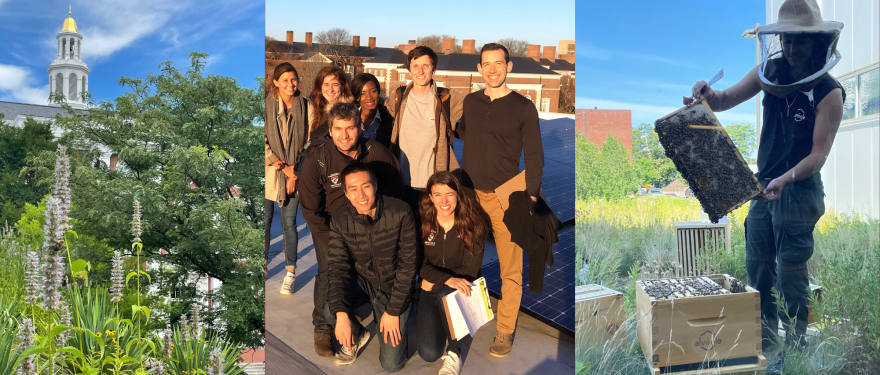Sustainability is a core value at HBS, and we endeavor to build a healthier, more sustainable, and inclusive community. We know that environmental sustainability is of growing interest to our student community and teamed up with the HBS Sustainability Group (Operations) and the Business and Environment Initiative to highlight six things prospective and current students should know about sustainability on campus.
Interested students can become Sustainability Associates
The Student Sustainability Associate (SSA) program employs one student from each first-year section to educate their peers through a number of projects and sustainability campaigns held throughout the year. Past SSA projects have ranged from the beehives (see below!) to assessing how well sustainability concepts are integrated into the first year’s curriculum in partnership with the HBS Business and Environment Initiative.
You’ll find beehives and rooftop gardens on campus
Beehives have been on campus since 2015 as part of a project proposed by our SSAs. Our four hives act as a natural fertilizer, increasing biodiversity on campus. HBS also has nine green roofs across campus, which range from low lying groundcover to tall, flowering plants, to small gardens of vegetables and herbs. Green roofs are excellent at reducing and retaining stormwater, reducing the heat island effect, and insulating the buildings. The veggies, herbs, and honey harvested at HBS are showcased at events and in the HBS dining halls!
The Business and Environment Initiative is a hub for environmentally-focused research and teaching
With more than 800 MBA students interested in environmental issues, 40+ affiliated faculty, and over 8,000 alumni contacts, the HBS Business and Environment Initiative (BEI) leverages their network to deepen the understanding of environmental challenges confronting business leaders today. The BEI supports incoming MBA students pursuing careers and developing new companies at the intersection of business and the environment through programming including conferences, career panels, coffee chats, mentorship, and networking sessions. Second-year students can choose from over 15 elective courses with business and environment content, including courses such as Global Climate Change, Sustainable Investing, and Reimagining Capitalism.
Three student-led clubs focus on the environment
New HBS students interested in sustainability and the environment will find plenty of company on campus. In addition to becoming Student Sustainability Associates, students can join three clubs (the Energy and Environment Club; the Food and Agriculture Club; and the Sustainability Club), join our student government as a VP of Sustainability, and get involved with the annual Climate Symposium.
Sustainability is more than Environmentalism
HBS has been expanding its integration of social equity and environmental justice into the campus’ sustainability work, including targeting LEED Social Equity Pilot credits for relevant construction projects and incorporating environmental justice into curricular and extracurricular activities. In conjunction, the BEI is focusing on the integration of environmental justice in their speaker selection, course development, communications, and supporting student Independent Projects, internships, and fellowships.
HBS’s efforts reflect Harvard-wide sustainability and climate goals
Back in 2014, Harvard launched a five-year Sustainability Plan which set clear University-wide goals and priorities in five areas: emissions and energy, campus operations, nature and ecosystems, health and well-being, and culture and learning. After Harvard achieved its 30% GHG reduction goal (and HBS achieved a 47% reduction!), the University launched a separate Climate Action Plan, which includes the goals of being fossil fuel neutral by 2026 and fossil free by 2050.
Learn more about Sustainability at Harvard University.

